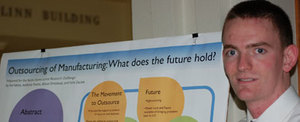Windmill-repair jobs, meat-eating Brazilians lie ahead, ‘Foresight’ students report
Published: December 10, 2010 / Author: Ed Cohen

“You cannot lead if you don’t know what is coming at you,” said Dean Carolyn Y. Woo in 2009 at the launch of the Foresight in Business and Society course in Notre Dame’s Mendoza College of Business.
Here’s some of what is coming at us, according to students who took the course in fall 2010:
- a booming job market for windmill-repair people
- a developing world with an increasing appetite for meat
- an uptick in manufacturing jobs in, of all places, the United States
On December 9, 2010, about 300 business majors presented posters summarizing their research for the Foresight in Business and Society course, which aims to teach students to think critically about emerging global and environmental trends, their implications, proposed actions for intervention, and the ethical considerations of different choices.
Mendoza is the first business school to require such a course as part of its core curriculum. Students take the course junior year.
The more than 60 posters displayed in the college’s atrium examined topics including corporate philanthropy, the future of capitalism in Cuba, and water purification in sub-Saharan Africa.
One team found that although wind turbines are likely to continue to multiply as an alternative energy source, the real job growth will be in maintenance and repair services, not manufacturing.
Another team predicted that the seemingly irreversible trend of U.S. companies outsourcing manufacturing jobs is likely to turn around as transportation costs rise and the supply of cheap labor dwindles in outsourcing Meccas like China.
More than one team examined the increasing appetite for meat in countries like Brazil, which are experiencing a growth of the middle class. With more money, people tend to eat more meat, but there are health and environmental costs to more meat production and consumption.
Click here for a more detailed look at these and other projects.
The Foresight in Business and Society course begins with an exploration of major emerging challenges, including sustainability, population growth, climate change, and issues caused by changing demographics. Student teams are then required to conduct an in-depth analysis of a specific topic to assess change, trends, expected and alternative futures, and business implications for achieving positive outcomes.Each team creates an extensive futures research report, which is presented as a poster at the end of the semester.
Felix J. Zaczek V, whose team looked at the future of manufacturing outsourcing, said he was skeptical about the course at first but that it opened his mind to new considerations. One of the skills covered in class, he said, was how to map a system. This involved creating a diagram identifying all the stakeholders in a situation.
The diagrams often grew to huge proportions, he said.
“That really shocks you because you don’t really always consider every stakeholder out there. That’s something that I think is really useful for business,” Zaczek said. He added, “After this class I’m going to be thinking pretty broadly from now on, much more broadly than I did before.”
Ryan Coughlin, whose team looked at the future of solar energy, said the class taught different skills than any other he’s had, such as projecting into the future, looking at where trends are leading, and how to take environmental-sustainability into consideration along with social and political sustainability.
“And it showed us what role business can play in promoting that sort of sustainability, and that it’s not just a government thing.”
/news_and_events/news_articles/article/8090/windmill-repair-jobs-meat-eating-brazilians-lie-ahead-foresight-students-report




